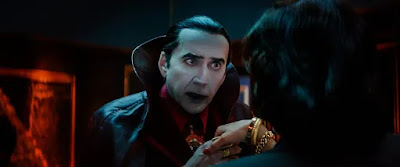Quite fitting that the horror genre is our most proficient at resurrecting dead franchises. Sometimes it’s a lively jolt. Other times, though, are just as gross and unnatural as the metaphor implies. Take Renfield, a noxious reworking of the Dracula mythos. It’s got exactly one good idea: casting Nicolas Cage as the famous vampire. Explicitly nodding toward the original Universal Monster performance by Bela Lugosi, the movie allows Cage to gnash into his lines with a grinning menace and a blasé affectation. You get the sense that Cage and Dracula alike have been involved in outsized phantasmagorias for so long now that they can do it in their sleep. Unfortunately, the movie never matches Cage’s potential, and ends up dulling his ability to go gleefully over-the-top by sticking him on the sidelines of a manic, hollow, formulaic antihero story. His familiar undead assistant Renfield takes center stage. He’s played by Nicholas Hoult in another of his failure-to-launch leading man roles. Renfield is now little more than a meek serial killer serving up victims for his master, until one day, through unconvincing love-at-first-sight with a cop (Awkwafina) and some vague self-help talk, he decides to kill the old vampire instead. There’s also a whole mess of flimsy story about a preposterous New Orleans mob family and their hair-trigger son (Ben Schwartz) mucking around town that mainly exists to populate the picture with more undifferentiated victims. It’s such a boring slop of a picture, that it can’t even muster the energy to give its setting any real local color among its other unimaginative faults.
The result is waves of gunfire, and goons dismembered in geysers of blood by the lead character as he aw-shucks assures us that he’s doing it for the right reasons. The result is a grindingly predictable movie with smirking attitude toward mayhem and murder that nonetheless asks us to imagine its characters are good and right. Seeing Renfield stand atop a pile of dismembered corpses and claim the moral high ground sure is something. The movie’s incessant jumpiness and inability to take anything seriously runs amok. Its discordant hollowness makes every half-hearted joke clang, every ugly shot composition or smear of muddy color and harsh light harder to watch, and ever self-satisfied cynicism wrapped in sentiment grosser by the second. To see a villain kicked so hard in the stomach that the contents blast out above and below simultaneously is an accurate reflection of all this movie has to offer. A moment like that makes me wonder what the intended reaction is. A laugh? A retch? An admiration that it’s willing to be so sophomorically scatological? In practice it’s a nonstarter, so over-the-top in a deadening film that’s never not at that fevered lack of imagination nothing lands with any impact. What a waste.
Better is Evil Dead Rise, which revivifies the eponymous cult classic series in a new setting. Instead of the cabin in the woods, we get a condemned high-rise apartment on its last few weeks before the remaining few residents have to move out. It’s a dank, creaky place full of ghost stories and dodgy electric work. And that’s before the demons swoop in from the other side. Their victims are even more sympathetic than the youths up for the slaughter in the previous outings. Here it’s a single mom with her teenaged older kids and one sweet moppet, and a pregnant aunt, too. If you think that’ll save them all from possession, zombification, and gruesome deaths, you’d be right for only two of them. Director Lee Cronin does his best to swoosh the camera around and linger on gnarly injuries here and there. A key recurring image is a glowering, brow-forward look that the mutilated corpses get when staring down their prey. It stretches tension as the baddies salivate with the promise of viscera exploding every which way. They’re eager to get to the gore, and Cronin knows how to hold back the pace and keep his few splashy effects to their most effective uses for maximum surprise.
It doesn’t have the hysterical gonzo goofball gore of Raimi’s original trilogy or the squirmingly sustained excessive bodily specificity of Fede Alvarez’s remake. It also doesn’t push as hard, settling into long stretches of suspense and fleeting splatters and queasy insert shots. But it chooses its moments wisely, and shares with its predecessors a giddy fatalism, cut loose from the expected safety. Its respect for human life comes from its willingness to see the desperation on its characters’ faces as the curse comes crashing down with bloody inevitability. Then the fun is, once more, squirming with them. When Cronin swings with a wild idea—a boy choking to death on an eyeball—it lands with the shock and awe that’s the franchise’s calling card. But truly only in an Evil Dead movie can it be a little disappointing when a whirring tattoo gun misses its sensitive mark. (At least the cheese grater hits its mark—ouch.) Still, if the least one of this series is reasonably compelling, slightly underwhelming tension and bloody release, that’s not so bad.



No comments:
Post a Comment